
Atlas F1 GP Editor
BAR's technical director Geoff Willis recently said the Renault R24 is currently the best car on track. Williams driver Ralf Schumacher echoed the same sentiments. Considering that last summer, when Mike Gascoyne announced he was leaving Renault for Toyota, some were already prediciting the downfall of the Anglo-French team, it seems unlikely Renault are going anywhere but up. David Cameron met with Bob Bell, previously Gascoyne's deputy and right hand man and now the technical director of the coolest outfit in the paddock. Exclusive for Atlas F1
But how much difference did Gascoyne's departure actually make to the day to day running of the team? "It didn't, really, but that's because of the way we structured ourselves," Bell says.
"Mike and I are very close as friends as well as working together professionally, and I was obviously conscious of his discussions with the company to move on. It didn't surprise me. I was genuinely sad to see him go because he's a very good technical manager and did a hell of a lot to bring Renault back to where they are now, and it was a great loss. And not only was it a great loss but it was someone else's gain, which is never a good thing.
"But I made the conscious decision to stay and continue on with what he started, and that was a privilege to be given the opportunity to do that, and I'm quite happy to do it. It's a lot of responsibility, although it didn't really mean a big change in the day to day work load; the big difference is the fact that the buck stops with me. But that doesn't bother me; we have a fantastic team of people at Renault, and it's very easy to deal with that situation when you know you have a great team of people working with you. And I very much enjoy working there and the people I work with, so it's been a very easy transition for me."
The design process of a modern Formula One car is no longer the domain of a single man; the inherent complications involved in the process would make that impossible. While Gascoyne was the Technical Director, Bell was his deputy and therefore privy to every decision made in the gestation of a new car, which would have aided enormously in the transition.
Renault have a different design philosophy to most teams in that they have two chief designers, Mark Smith and Tim Denshaw, working on alternate programmes for successive years, and their work overlaps each other for substantial parts of the year. For example, the R24 design process started towards the end of 2002 when Smith finished work on the R202, while Denshaw was working towards completion of the R23.
What this entailed was early integration studies on the engine with the engineers in Viry Chatillon before a gradual flow through of resources from the R23 team as they become available. By mid 2003, virtually everybody on the design side was working on the R24, at which stage Denshaw started the initial design work on next year's R25. It's a never ending cycle, and one that is showing dividends for Renault.
"They don't have any active involvement on the car that they're not assigned to, unless for instance there was a problem with one of them and they fell ill, or if there are carry over components or parts from an earlier car then they may have some passing involvement with discussions if there are any issues with them."
This is an elegant solution to the balancing act between fresh design perspective and active problem solving, and the impressive results in winter testing and, more pertinently, on track point to the Renault approach as one that the other teams will adopt over the coming years. Bell's was no small part of this undertaking.
"It's always a great sense of pride to be involved in any new car project, to be seeing the actual hardware running and also to see it meeting expectations. And that's a great sense of pride not just for me but for everyone in the factory, and I think everybody does feel that. It's just a great shame that not everyone in the factory can enjoy it to the same direct sense that those who travel with the car and operate the car are privileged to."
Bell's involvement in Formula One is substantial. After completing his doctorate in aerodynamics at the University of Belfast he joined McLaren, moving up through the ranks over an incredibly successful period in that company's history, including the historic 1988 season when the cars he worked on won 15 of the 16 races run. From there he moved to Jordan, where he met up with fellow McLaren alumni Gascoyne, working directly underneath him during the yellow team's rapid move up the grid. Bell was one of the select group that Gascoyne convinced to move to the team then known as Benetton after his defection.
His credentials point to success, and Bell is helping to bring it to Renault. The growing achievements there reflect those he has previously enjoyed, but how do they compare to Bell himself? "It's an interesting contrast because at McLaren I witnessed the very rapid early growth of the company, and the very rapid growth in its performance on the track, and that was a wonderful thing to be a part of.
"It was easier then than it is now, for sure!"
This year has seen a remarkable improvement in a number of teams, and the net result is that the competition is close between five teams. Ferrari are obviously at the top of that group, while McLaren are suffering an alarming number of failures in the races, but on pure pace there is little between them over a variety of tracks.
What has led to this difference compared to last year? "I think two main things have made the difference," Bell commented. "One is that the rules have been relatively stable; we do have bodywork changes for this year, but they're not major changes and that I think helps close the gap on competition.
"And also the fact that the cars are becoming more reliable, and I think that aids closing the performance gap, because people spend less time worrying about how to make sure their cars finish the race and focus most of their efforts on performance enhancement, performance development."
Reliability has been a key word over the last few years, and it's obvious that it has improved phenomenally from just five years ago. There is a wealth of experience among the key players at the top teams now, and the recruitment boom in engineering positions of the last few years has played a big part in that, as well as the absorption of people from the teams that have folded recently.
On top of this, tools such as Finite Element Analysis programmes has vastly improved the teams' abilities in the structural tests that they use for analysis of components; their understanding of loading spectra and manufacturing methods has meant that quality control on the cars has gone through the roof.
All of this has led to the difference between winning and losing being incredibly close now. In an age where thousandths of a second are vital, how do you make a positive difference for a team? "I think now more than ever everything, all the bits, have to be right.
"All of those things, and the organisation of the team, have to be slick; the production side has to be slick, and there's just so little room anymore to have a weak area. And that's why it's difficult."
But with all things being equal, and effectively they are; all of the teams are professional, all of the teams have built reliability and are focused on every part of the car; does this mean that luck comes more into the equation now? "I don't think it does," Bell observed, warming to the theme. "When you think of the enormity of the task of putting a Formula One team together and doing what it has to do through an operational year, if you actually look at the gap between slowest and quickest in absolute terms it's not a huge margin.
"When you consider the concept of going out and starting a new design, a new team and new operation from scratch you'd very quickly get quite close; the bit that remains, the final couple of seconds or whatever, that's the really difficult bit. And I don't think that luck plays into it really very much because to make that final step, to be really competitive and right at the front, you've just got to put so much effort and work into lots of small details.
"Yeah, sure, luck comes into it, particularly when the cars are actually out on the track and they are completely away from our control, but away from the track you make your own luck."
There has been a dilution of the ability of a driver to make a substantial difference to a team's performance for a number of years because of the incredible technology built into the cars, but ironically with this technology closing the performance gap between the teams, the drivers now have more of an opportunity to actually make a difference.
So in a period where their abilities are proving more valuable, how have the Renault drivers performed? "I think they've done a good job for us, as they did last year. We had Fernando Alonso's mistake at the last race [in Malaysia] in qualifying, which was a disappointment, but he was out there pushing and that's a risk that you take. I have every confidence in both of them; they're good, solid, fast drivers, both capable of winning races, and I think we're lucky to have a good pairing like that. I think they're doing a good job."
"It really caught us out, and I don't suppose we know all of the issues behind that, but I think we understand the important one. But it's another facet that has to be absolutely right, and the decisions that get taken now go way back to testing weeks, a month ago, and it's just typical of all of the things that you have to get in place."
So how good is the current Renault? BAR's Technical Director Geoff Willis has stated that he thinks the R24 is currently the best car out there, and Ralf Schumacher has also said as much. The performance has been great, but does Bell agree that he has the best car on track? "Well it is enormously flattering, but I think I'll form my own views depending upon how we do over the course of the season.
"I think it's a bit early to say yet, but it's a good car and it's performed well so far, but there's a lot more we can do with it and need to do with it. You have to start the season with a good car, and I think we've done that and got that, and now the important thing is to keep pouring development into it, to keep it that much further ahead of the rest, and what's really going to determine the outcome of the season is how well the teams can react to that situation of maintaining a performance development profile throughout the rest of the year.
"I find it quite difficult to judge. There is Ferrari's situation, and they obviously have an extremely good car, possibly the best car out there; what we don't know is just how much of their performance benefit is accruing from tyres. I don't think we know the answer to that; it's a very difficult one to assess. I think all I would say at the moment is our car is strongly competitive, and that means it's capable of running in the top three and challenging for podium finishes."
At the level Renault find themselves, how do they mark their progress? Is it a process of judging themselves against Ferrari and seeing where they are? "No you don't, I don't think we ever do that; you judge yourself on absolute terms; you just do the best job you humanly can to make the car better. You don't look at someone else's car and say 'well, we've got to be as good as that', because it doesn't really provide you with any additional information.
"If somebody's car is doing something particularly well you might look at it and try and understand why it's doing that, and try and thereby spur your own development along, but really it's almost a race against yourself. You don't do is say that Ferrari are half a second a lap quicker than us so we'll design our next car to be half a second a lap quicker; you just design it to make it as quick as you can possibly make it.
"In that sense it's an absolute thing, not a relative."
When Mike Gascoyne finally announced his move to Toyota last year, no one was overly surprised - least of all, his successor as the Renault Technical Director, Bob Bell. "I was aware of his desire at the time to move on when it came to light that he was having discussions with Toyota," Bell acknowledged in the Renault offices in Bahrain. "Mike's an ambitious person, so it didn't come as a huge surprise."
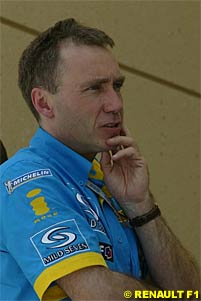 What did come as a surprise to most people was the announcement that Bell was to assume Gascoyne's position at the top of the technical tree, mostly because few people outside of the team had actually heard of the new boss. Subsequently, there were suggestions that Renault's performance would suffer from such a high profile defection.
What did come as a surprise to most people was the announcement that Bell was to assume Gascoyne's position at the top of the technical tree, mostly because few people outside of the team had actually heard of the new boss. Subsequently, there were suggestions that Renault's performance would suffer from such a high profile defection.
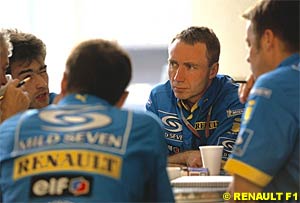 But do Smith and Denshaw ever work together on projects? "Well they do, and very closely in many ways," Bell confirmed. "They share the same office, they talk a lot, they go to each other's meetings, they're aware of everything that's going on with each other's cars, and so they work very well and in harmony with each other.
But do Smith and Denshaw ever work together on projects? "Well they do, and very closely in many ways," Bell confirmed. "They share the same office, they talk a lot, they go to each other's meetings, they're aware of everything that's going on with each other's cars, and so they work very well and in harmony with each other.
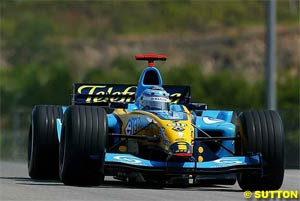 "This is different, I guess mainly because I have a much more active involvement in helping to steer things along, and also because it's a decade - almost two - beyond, and the technology and everything that has to be done now has moved on such a lot, so it's such a more difficult task. And that can be very frustrating, but it can also be so rewarding when you do get everything right and everything does come together and things do work out as planned; it's immensely satisfying.
"This is different, I guess mainly because I have a much more active involvement in helping to steer things along, and also because it's a decade - almost two - beyond, and the technology and everything that has to be done now has moved on such a lot, so it's such a more difficult task. And that can be very frustrating, but it can also be so rewarding when you do get everything right and everything does come together and things do work out as planned; it's immensely satisfying.
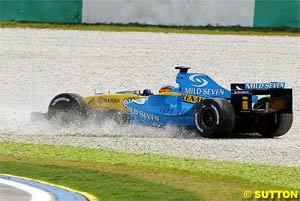 "There's just no room for error, with the drivers on the track during practice and qualifying, with the engine side of things and the consequences for losing grid places, the chassis side of things for reliability, the ability to be able to use tyres and tyre development, detailed understanding of aerodynamics and where a lot of small gains can be found, because the margins now for finding performance improvements are getting smaller all the time, and the ability to just whittle away at weight and specific stiffnesses.
"There's just no room for error, with the drivers on the track during practice and qualifying, with the engine side of things and the consequences for losing grid places, the chassis side of things for reliability, the ability to be able to use tyres and tyre development, detailed understanding of aerodynamics and where a lot of small gains can be found, because the margins now for finding performance improvements are getting smaller all the time, and the ability to just whittle away at weight and specific stiffnesses.
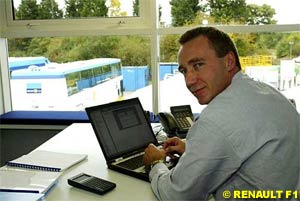 Notwithstanding, there was a question mark over their performances in Malaysia; Alonso started at the back of the grid, moved up to eighth in the race before his performance seemed to drop off, while Jarno Trulli moved up to third and looked like claiming a podium before again the performance seemed to drop off. "Well that wasn't the fault of the drivers; it was primarily an issue we had with the performance of the tyres, and how we used the tyres with the car. It wasn't really something we could level at the drivers.
Notwithstanding, there was a question mark over their performances in Malaysia; Alonso started at the back of the grid, moved up to eighth in the race before his performance seemed to drop off, while Jarno Trulli moved up to third and looked like claiming a podium before again the performance seemed to drop off. "Well that wasn't the fault of the drivers; it was primarily an issue we had with the performance of the tyres, and how we used the tyres with the car. It wasn't really something we could level at the drivers.
|
Contact the Author Contact the Editor |
Please Contact Us for permission to republish this or any other material from Atlas F1.
|
Volume 10, Issue 16
Atlas F1 Exclusive
Interview with Bob Bell
Interview with Gianmaria Bruni
Articles
Every Other Sunday
The Paint Job: Part V
2004 San Marino GP Preview
2004 San Marino GP Preview
San Marino GP Facts & Stats
Columns
The F1 Trivia Quiz
Rear View Mirror
Bookworm Critique
On the Road
Elsewhere in Racing
The Weekly Grapevine
> Homepage |